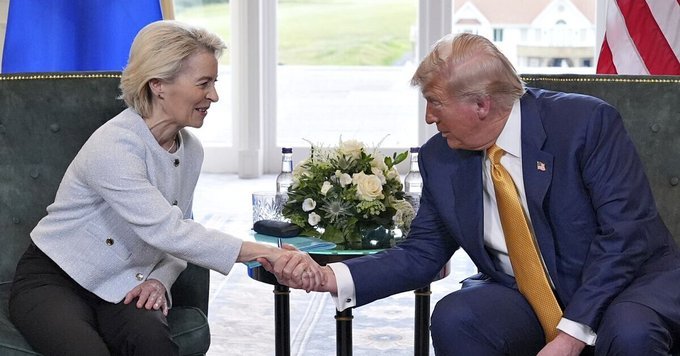Backroom deals, embassy contacts and brown liquor built a booming export trade. Now, the lobbyist who saw it all says the U.S. president’s dalliances with Vladimir Putin are an incoming “asteroid” for the industry.
Alliances sometimes begin by accident. Sometimes they end that way, too. Especially when Donald Trump is involved.

In the fall of 2013, Fred H. Hutchison was hanging around a mixer at the Lithuanian embassy, which sits inside the remaining tower of a partially demolished mansion a couple of miles north of the White House. After several decades as a gun-for-hire Washington, D.C., lobbyist, Hutchison had forgotten more of these events than most people ever go to. But this one he remembers.
Partway through the evening, Hutchison heard a diplomat grumbling about the United States’ jealous grip on its enormous newly tapped reserves of shale gas. They got to talking.
The diplomat turned out to be the deputy head of the Lithuanian mission, Simonas Šatūnas. Lithuania was totally reliant on Russia for gas, he said. He wanted the Obama administration to share the love, he told Hutchison, and approve gas exports to Europe.
Encouraged by Šatūnas and his diplomatic connections, Hutchison set up a pressure group of around a dozen D.C. embassies — all from eastern and central Europe — that would work alongside the U.S. gas industry in service of one goal: bringing more U.S. liquefied natural gas (LNG) to Europe. These post-Soviet countries did not share the faith, widespread in other parts of the continent, that Vladimir Putin’s imperial impulses could be sedated by the multi-billion euro energy trade with the European Union.
They couldn’t have known it at the time, but the pair would soon be swept into a historic energy shift that would reshape the U.S. relationship with Europe, tilt Washington’s interests toward the EU’s eastern rim, and allow the continent to swap Russian for American gas after Moscow invaded Ukraine.
Donald Trump is now threatening that energy alliance — one he claims to champion, even forcing the EU this week to commit to a handshake agreement to import a logistically infeasible $750 billion worth of U.S. energy.
The widening fear on the EU’s eastern fringe is that Trump — despite recently sharpening his tone with Putin —will undermine this trade by offering the Russian president huge concessions and “enormous economic deals” to end his war, all while resurrecting the autocrat’s international standing in the aftermath.
It’s the sledgehammer that could smash the West’s economic firewall around Russia — and take American energy with it, according to former and current diplomats from that part of Europe, as well as U.S. experts and industry figures. Already, oil and gas executives are cautioning the White House about this outcome, while also plotting in case their pleas are ignored.
“The one thing that would derail the spectacular growth of the U.S. [LNG] industry is the reopening of flows from Russia. There’s no question about that,” said Geoffrey Pyatt, who was ambassador to Ukraine when Russia invaded Crimea in 2014 and led the State Department Bureau of Energy and Natural Resources under former President Joe Biden.
The pipelines to Europe aren’t being switched back on. Yet. But U.S. sanctions on Russia are softening, and some Europeans are whispering about reviving Russian energy imports. American investors have even discussed a partnership with Russian officials to reopen gas flows to Germany.
“Of course, we are concerned about the talk of a return to Russian energy, and the lack of clarity about the U.S.’s position,” said an official from an Eastern European country, who was not authorized to speak publicly. “But we are hopeful that we will win the argument that it would be a mistake to go back.”
How the U.S. energized Europe
It’s almost unthinkable in the age of Trump’s “American Energy Dominance” and the EU’s scramble to quit Russian gas that a desire for shiploads of U.S. gas was once unfashionable on both sides of the Atlantic.
U.S. manufacturers wanted to keep the shale revolution’s rewards for themselves. While in Western Europe at least, Wandel durch Handel (the lofty German foreign policy assumption that troublesome neighbors like Putin would “change through trade”) was conveniently aligned with the roaring economic benefits of cheap Russian gas.
“The Germans, the French, the Italians, the Austrians, everybody from Western Europe was content with the status quo,” said Hutchison in an Idaho farm-boy drawl. But countries like Lithuania, Poland and the Czech Republic “understood their vulnerability. And having been former Soviet satellites, understood the risk they faced.”
Russian gas will always win on price, given the extra expenses for U.S. LNG: Compressing the gas into a liquid, loading it onto ships, hauling it across the Atlantic and then regasifying it for use on the continent.
But countries like Lithuania were willing to pay a premium for energy from an ally because of their history and because “they had a front row seat to Russia’s actions” when it illegally annexed Ukraine’s Crimea in 2014, Pyatt said. Then the U.S. ambassador to Ukraine, Pyatt recalled that Polish Foreign Minister Radoslaw Sikorski desperately wanted to wriggle out of Russia’s grip.
“That’s 100 percent of the explanation,” Pyatt said. “It’s the near neighbors who realize that Ukraine was the bulwark that was going to protect Eastern Europe from a revanchist Russian agenda that went far beyond Ukraine.”
So it was easy for Hutchison to convince those countries to join the U.S. LNG push. In early 2014, he formed the organization LNG Allies as a public face for his embassy pressure group. He said the initial funding came from two trade bodies: the now-defunct America’s Natural Gas Alliance and the American Petroleum Institute (API). A spokesperson for API confirmed it had “previously” funded the group.
